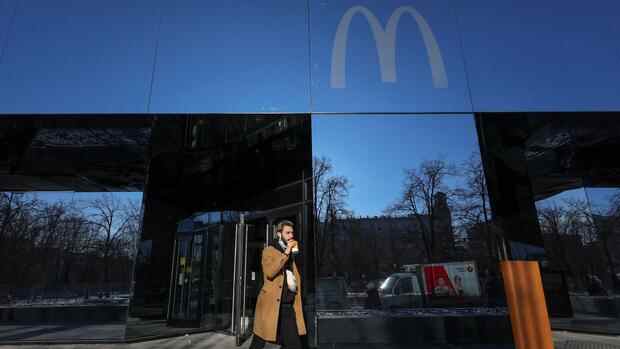Moscow The McDonald’s at the Baumanskaya metro station in central Moscow is jam-packed. There are several universities nearby, including the Bauman MSTU, one of the largest technical universities in Russia. Many students sit in the fast food restaurant during their lunch break – perhaps for the last time.
Darja at the checkout has her hands full clearing the line. She will continue to work here until March 14th. And then? “I have no idea,” says Darja curtly and waves to the next customer.
It’s a hot topic: On Wednesday, McDonald’s announced that it was temporarily stopping its business in Russia. The group operates 850 branches nationwide and employs around 60,000 people. According to McDonald’s, it also cooperates with 160 suppliers in Russia, who employ a further 100,000 people.
McDonald’s is just one of around 400 companies that have announced their withdrawal from Russia after the Russian invasion of Ukraine. All areas are affected, from the oil and gas sector to the construction and finance sector, clothing and food industry to automotive construction, aviation sector and the telecommunications, electronics, software and internet sectors.
Top jobs of the day
Find the best jobs now and
be notified by email.
Industry giants such as Visa and Mastercard, Coca-Cola, VW, Siemens, Apple, Cisco, Dell, Facebook, SAP and Canon are turning their backs on the country. And more and more follow: The Japanese clothing retailer Uniqlo, whose owner Tadashi Yanai announced just a few days ago that he would remain in Russia despite the sanctions, has now announced the closure of its stores after March 20.
Right at the start of the wave of emigration by Western companies, ex-President Dmitry Medvedev threatened international corporations with nationalizing their operations in Russia. This announcement is now slowly taking shape: The government is discussing a legislative initiative by the Kremlin party “United Russia” on the appointment of an insolvency administrator in the relevant companies.
Law for two scenarios
This insolvency administration should be able to be determined in two cases:
- Firstly, when the group’s management “actually stopped” running the company because they left Russia, for example.
- Second, when corporate management takes steps leading to “unreasonable cessation of operations, liquidation, or bankruptcy.” This also includes the announcement that the company will cease business activities in Russia “without obvious economic reasons”.
In the first case, the insolvency administrator is to be appointed for three months, in the second for six months. In the second case, the owners would also have the possibility to reverse the state measure if they declared in court that they would resume work.
According to this, representatives of the state infrastructure bank VEB or the agency for deposit protection come into question as insolvency administrators. However, the agency only takes care of financial institutions, all other companies fall within the remit of the VEB.
The German carmaker employs thousands of people in Russia.
(Photo: dpa)
According to the Kremlin’s plans, the insolvency administrators should ensure the continued employment of the employees and take stock. Their main task would be to create a new organization on the basis of the old organization in the course of a bankruptcy proceeding.
The shares of the resulting new company are then to be sold at auction. If no buyer is found, the company is nationalized.
Around 60 companies have so far appeared on a first list of companies that could be nationalized. Among them are the German car manufacturers VW and Porsche.
Since 2007, VW has operated a factory in the city of Kaluga, 170 kilometers southwest of Moscow, which has developed into an automotive cluster in Russia, also thanks to the VW settlement. Until recently, the VW Tiguan, Polo and Skoda Rapid models rolled off the assembly line in the factory, which has an annual capacity of 225,000 vehicles. In addition, the group has the Russian carmaker Gaz, based in Nizhny Novgorod, assemble it.
Here you can find more Handelsblatt articles on the subject:
Overall, according to estimates by the Bundesbank, German direct investments in Russia alone amounted to 24.6 billion euros as of 2019. German companies were thus among the largest foreign investors in Russia until the outbreak of war.
But that seems history. While the Russian Ministry of Economics described the threatened expropriations as a stimulus intended to induce foreign companies to reconsider their withdrawal from Russia, other politicians from the Russian leadership have already taken a liking to the expropriations.
The head of the Russian State Duma, Vyacheslav Volodin, was almost euphoric. If McDonald’s wants to close, that’s no problem, after all, 100 percent of the ingredients there are made in Russia. “But tomorrow there shouldn’t be a McDonald’s, but an ‘Uncle Vanya’,” he demanded.
Then prices could be lowered at the same time and employment could be secured. “That has to be the approach,” Volodin said.
More: Russia’s economy: The sanctions are hitting the country with full force
